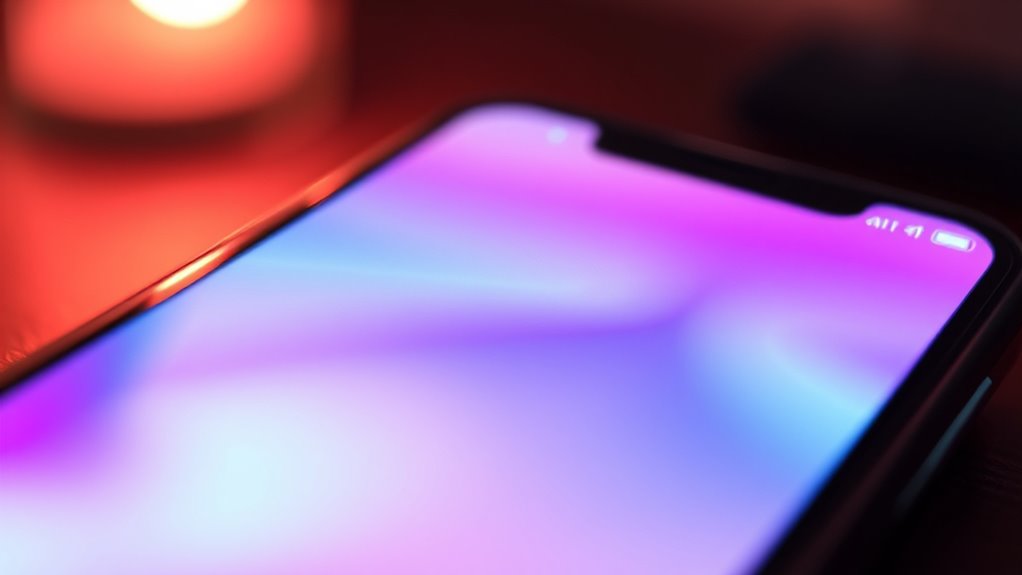When you see NGL in a text, it means “Not Gonna Lie,” a phrase used to share honest opinions or feelings casually. People often use it to show they’re being sincere or vulnerable, especially on social media or in chats. It helps keep conversations quick and authentic. If you want to understand how NGL is used and its variations, you’ll find more insights below.
Key Takeaways
- NGL stands for “Not Gonna Lie,” used to introduce honesty or blunt opinions in digital conversations.
- It signals sincerity and transparency when sharing feelings or opinions casually online.
- Commonly used on social media, in messaging, and gaming chats to express vulnerability or honest feedback.
- NGL’s popularity grew in the 2010s with social media trends and teen slang evolution.
- It is typically informal and best suited for casual settings; overuse may reduce its impact.
The Meaning of NGL in Digital Communication
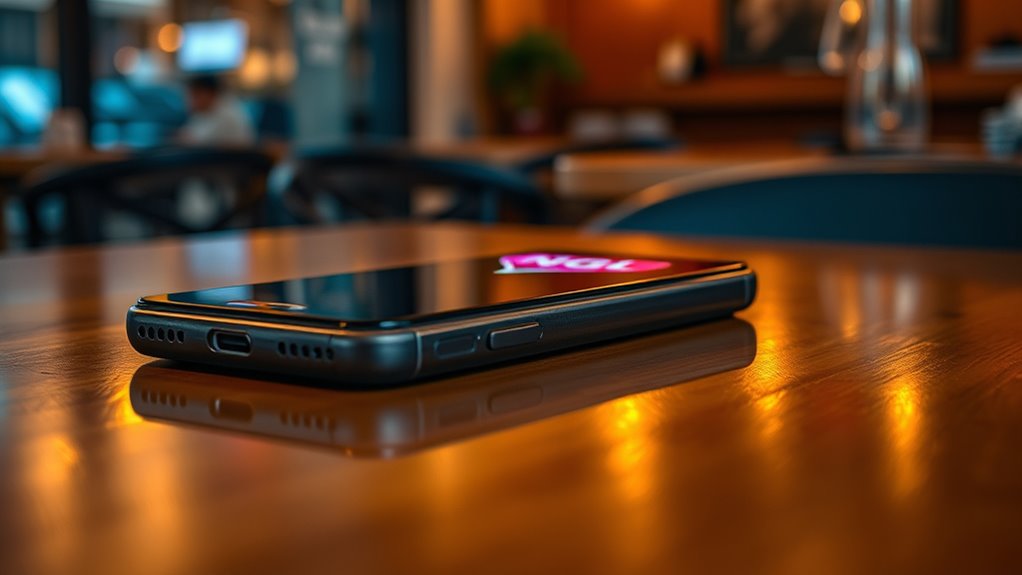
Ever wondered what NGL means when you see it in a text message or on social media? NGL stands for “Not Gonna Lie,” a common phrase in digital slang evolution. It’s often used to introduce honest opinions or feelings, even if they might be blunt. Using NGL can show transparency and authenticity, but it’s also important to maintain online etiquette. Overusing abbreviations like NGL might come across as abrupt or disrespectful, so knowing when and how to use it matters. As digital communication continues to evolve, phrases like NGL help keep conversations quick and casual, fitting into the fast-paced nature of social media. Understanding the meaning behind NGL helps you communicate more effectively while staying current with online language trends. Being aware of online slang and its appropriate usage can enhance your digital interactions.
Origins and Popularity of NGL
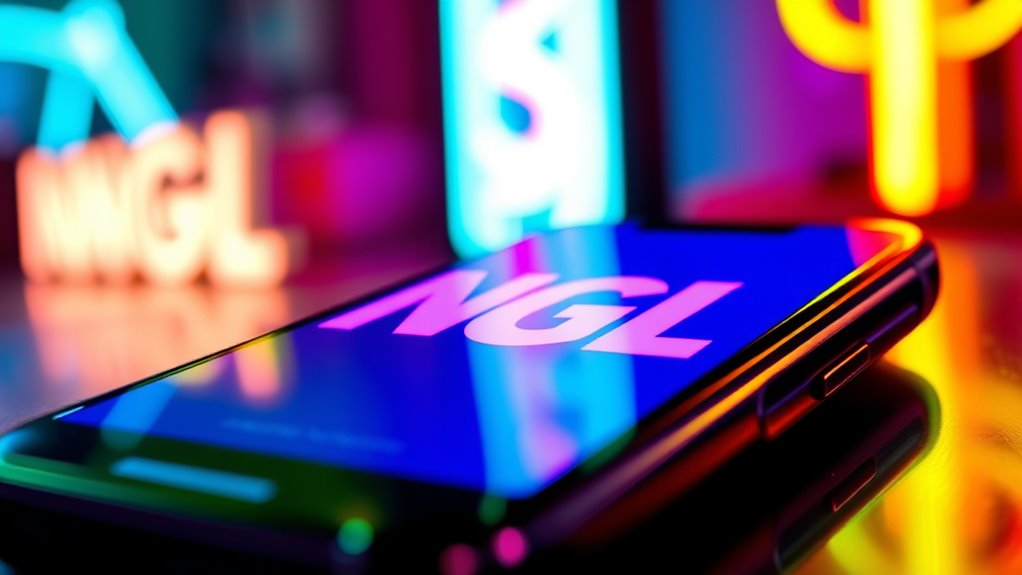
The phrase NGL gained traction within online communities and social media platforms, quickly becoming a staple in digital conversations. Its rise reflects the broader history of internet slang, where abbreviations evolve to save time and space. As texting and social media grew, users sought efficient ways to communicate, leading to the evolution of abbreviations like NGL. Its popularity skyrocketed as users appreciated its directness and relatability. Below is a table illustrating key milestones in this evolution:
| Year | Development |
|---|---|
| 2000s | Emergence of internet slang |
| 2010s | Rise of social media platforms |
| 2015 | Popularity of abbreviations like NGL |
| 2018 | Widespread adoption in memes and chats |
| 2020s | NGL becomes mainstream in digital culture |
Furthermore, the use of abbreviations like NGL can influence communication styles, making conversations more concise and expressive in the digital age.
How to Use NGL in Texting and Messaging
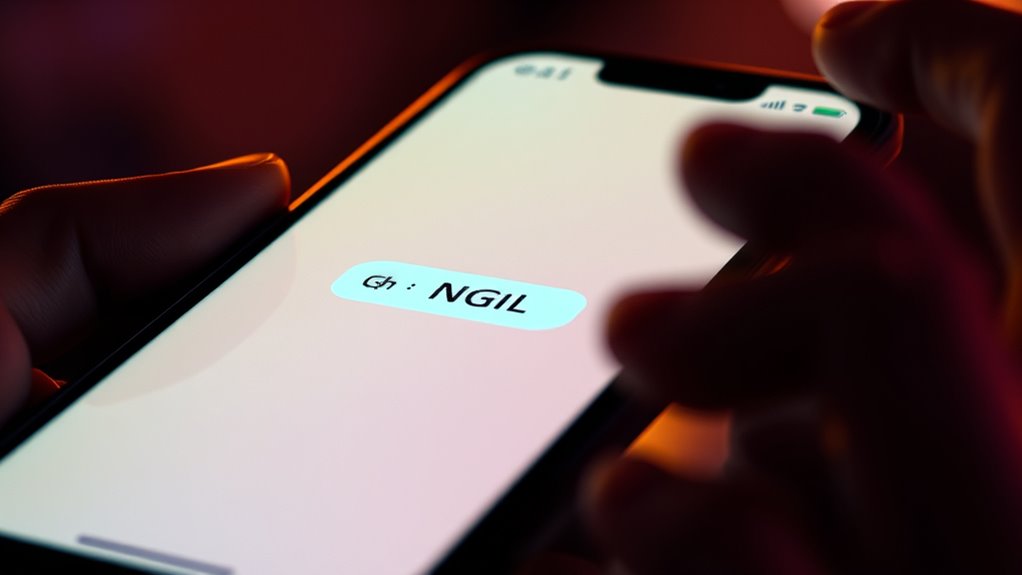
When you want to ask someone for an honest opinion or clarify a truth, using NGL in your messages can make your intent clear and direct. Incorporate NGL appropriately to respect communication etiquette and guarantee your message is understood. Keep your tone genuine, and avoid overusing slang to maintain clarity. Being digitally literate means knowing when and how to use abbreviations like NGL without confusing your recipient. Place NGL at the beginning or within your message to emphasize honesty or transparency. Remember, context matters; don’t overuse NGL, as it might seem insincere. Clear communication is key, so match your tone to the situation, and always be respectful of the other person’s feelings or opinions. Utilizing user consent management can help you understand how your message may be received based on privacy and communication preferences.
Examples of NGL in Social Media Posts
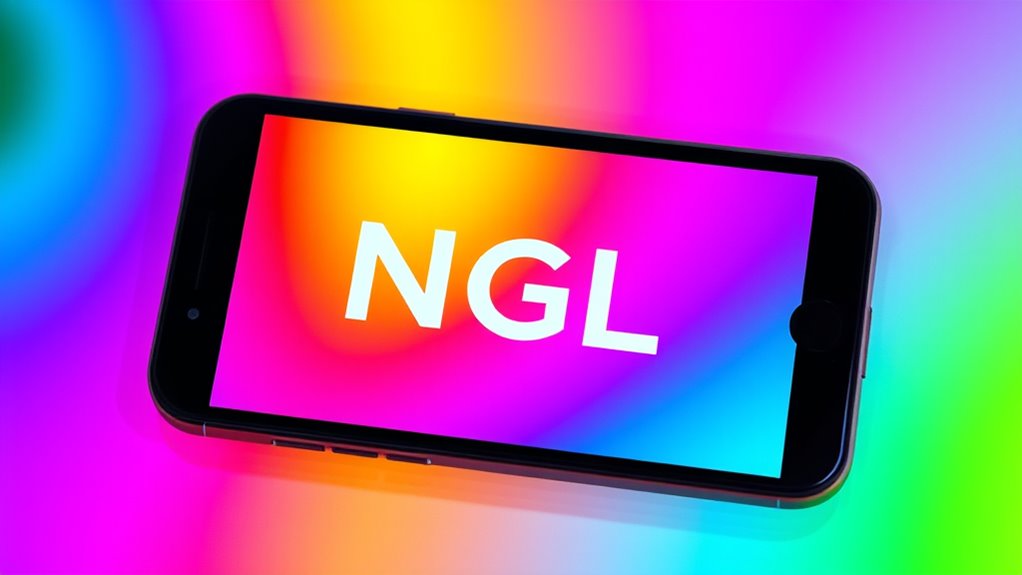
On social media, NGL often appears in posts or comments to show honesty or vulnerability. For example, you might see someone say, “NGL, I’m nervous about the exam,” encouraging genuine reactions from followers. These posts often invite emoji reactions, allowing others to express support or agreement quickly. However, sharing openly can have privacy implications, especially if personal details are involved. Engaging in mental and emotional well-being techniques, such as mindfulness or meditation, can help individuals manage feelings of vulnerability and promote emotional resilience.
| Example Post | Possible Reaction | Privacy Concern | Advice |
|---|---|---|---|
| “NGL, I miss high school.” | ❤, 😢 | Revealing feelings publicly | Think before sharing. |
| “NGL, I’m struggling with work.” | 👍, 💪 | Personal struggles exposed | Consider who can see it. |
| “NGL, I love this song.” | 🎶, 🔥 | No privacy risk | Enjoy sharing music. |
| “NGL, I’m not a morning person.” | 😴, ☕ | Low privacy risk | Share casually. |
Variations and Similar Acronyms to NGL
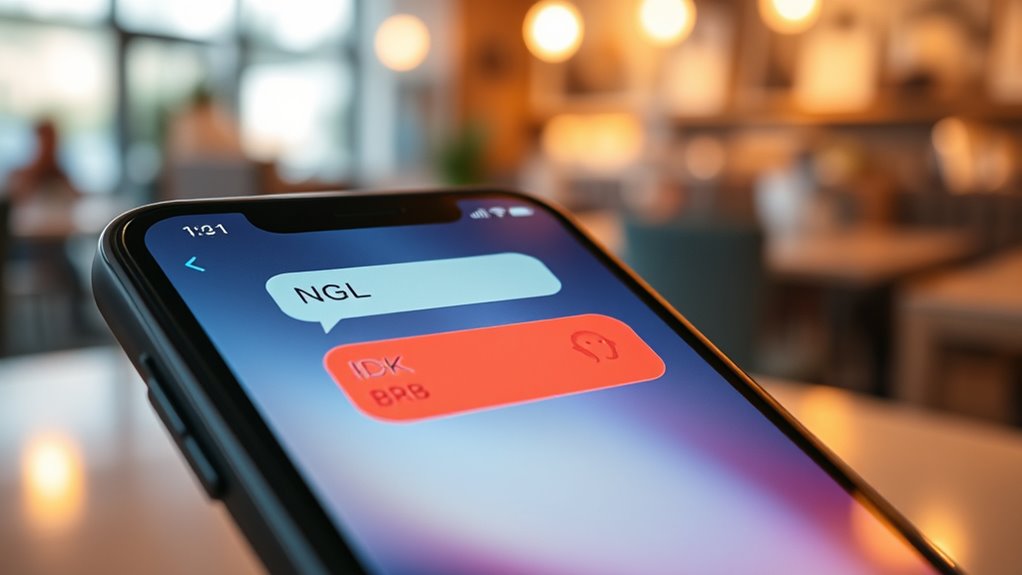
- IDK – “I don’t know,” often used to show uncertainty or honesty.
- TBH – “To be honest,” signaling sincerity.
- Je pense que – French for “I think that,” used to share personal opinions.
- XD – An emoji-based acronym expressing laughter or fun.
- Eye patches can also contain beneficial ingredients like collagen and hyaluronic acid to improve skin appearance.
These variations help you connect more authentically, whether in English or ngl in different languages, making your messages more genuine and relatable.
When to Use NGL Appropriately

NGL is best used when you want to express honesty or vulnerability about your feelings or opinions, especially in casual conversations. It’s appropriate for informal chats with friends or close contacts where a relaxed tone is suitable. However, avoid using NGL in formal settings such as professional emails, interviews, or official communications. In these contexts, maintaining an appropriate tone is essential, and slang like NGL can seem unprofessional or disrespectful. Use clear, straightforward language to convey sincerity without risking misunderstandings. Knowing when to use NGL helps you communicate authentically without crossing boundaries or appearing inappropriate. Save this acronym for casual interactions where openness is welcomed, and steer clear of it in situations that demand formality and professionalism. Additionally, understanding industry trends can help you determine the appropriate tone and language for different communication contexts.
Common Misunderstandings About NGL
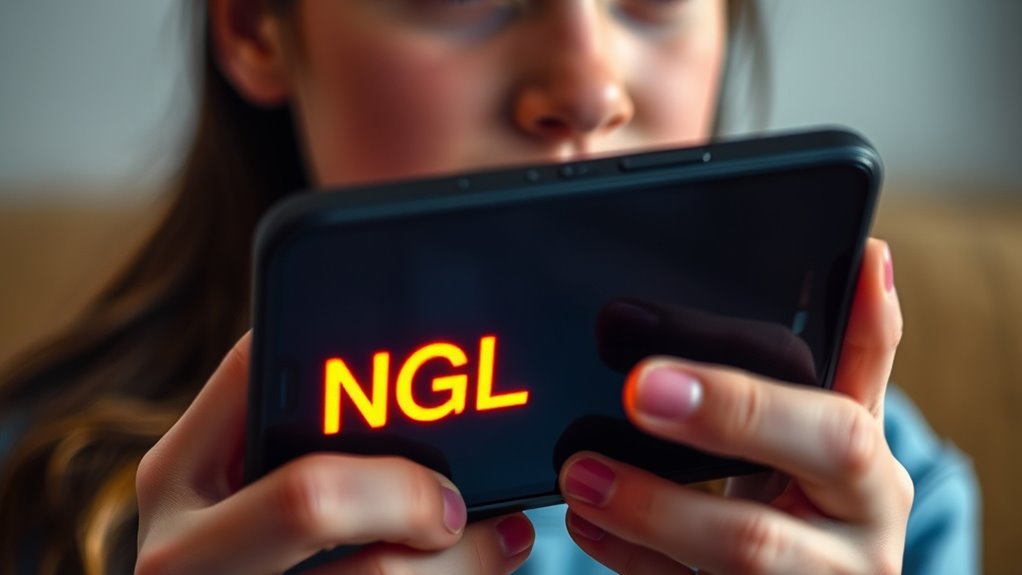
Many people mistakenly think NGL always means something negative or serious, but it can also be casual or playful. Overusing NGL in your messages might make your intentions unclear or seem insincere. It’s important to understand its proper context to avoid misunderstandings. Recognizing communication nuances can help you interpret and use the term more effectively.
Misinterpreting NGL Intent
Because the meaning behind NGL can vary depending on context, people often misinterpret its intent. The tone of NGL messages can be unclear, leading to misunderstandings. Here are common pitfalls:
- Assuming NGL is always casual or friendly, ignoring situations where it’s used professionally.
- Misreading the tone of NGL messages, which can seem honest but may come across as blunt or even harsh.
- Overlooking that in professional settings, NGL might carry an unintended tone, risking miscommunication.
- Believing NGL is only used among close friends, when it can appear in formal or serious conversations.
- Not recognizing that decluttering and organization can influence how messages like NGL are perceived in different contexts.
Understanding the context helps prevent misinterpretations. Always consider the tone of NGL messages and the setting to avoid confusion.
Overusing NGL Frequently
Overusing NGL can lead to misunderstandings and diminish its impact in conversations. When you rely on nagl overuse, it can seem insincere or like you’re trying to soften criticism constantly. Your texting habits might include using NGL so often that it loses its meaning, making your messages feel repetitive or less genuine. People may start to ignore or overlook your NGL messages, thinking you’re overusing it without real intent. To avoid this, use NGL sparingly and only when you genuinely need to share an honest thought. Remember, overusing NGL can dilute its purpose, so moderation is key to keeping your communication clear and impactful.
The Role of NGL in Online Casual Conversations
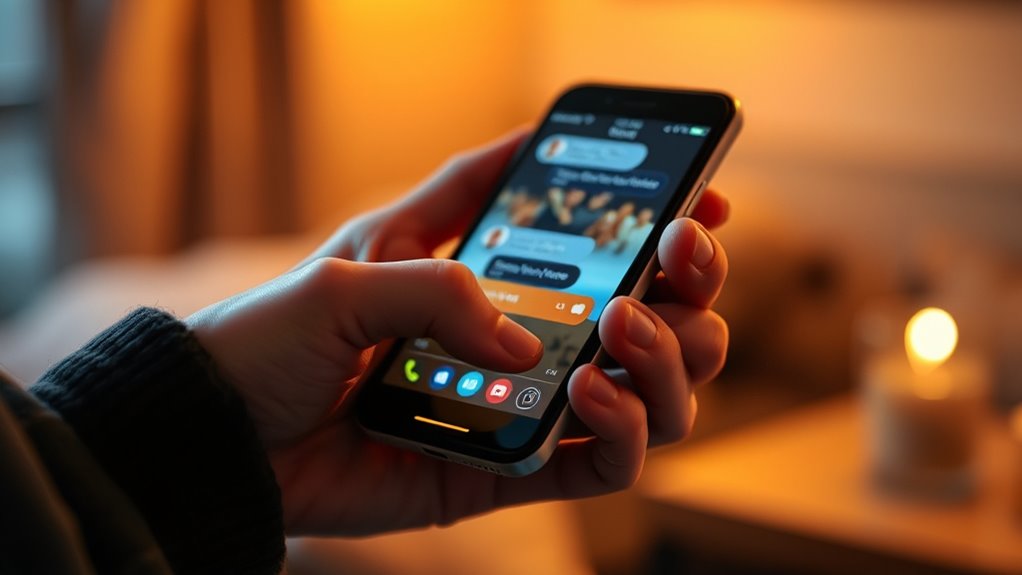
Have you noticed how often NGL pops up in online chats? It plays a key role in casual conversations by helping you navigate cultural differences and understand tone and intent. When someone uses NGL, they’re often sharing honesty or vulnerability, so recognizing its context is crucial. To better grasp its role, consider:
- It signals sincerity in casual exchanges.
- It helps clarify emotional tone.
- It encourages openness and honesty.
- It reduces misunderstandings across different backgrounds.
- Understanding projector technology can also enhance how you interpret visual cues in digital communication.
NGL in Different Online Communities
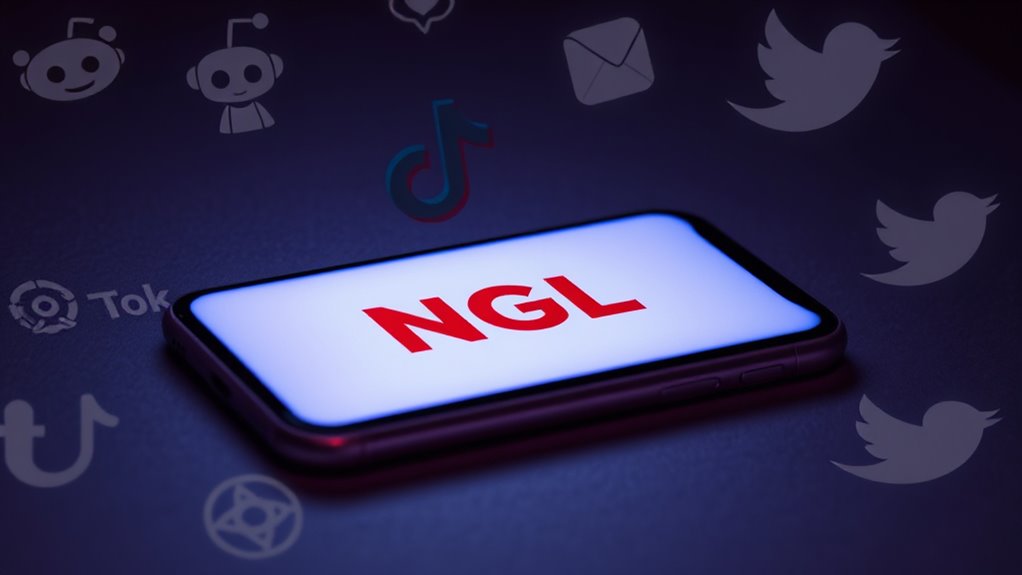
You’ll notice NGL appears across various online communities, from social media posts to gaming chats. Teen slang often uses it to share honest feelings, while gamers might use it during banter or team coordination. Understanding how different groups incorporate NGL helps you see its evolving role in digital conversations. For example, some users may reference caffeine content in humorous or relatable ways when discussing their energy levels online.
Social Media Contexts
How is NGL used differently across various online communities? On social media, users often incorporate emoji usage to add emotion or humor when sharing NGL messages, making interactions more personal. Some platforms emphasize privacy concerns, leading people to use NGL for honest confessions or questions without revealing identities. Here are four ways NGL appears in social media contexts:
- Sharing anonymous compliments or criticisms.
- Asking for honest opinions about posts or photos.
- Expressing vulnerability while maintaining privacy.
- Using emoji combinations to soften or emphasize messages.
In some communities, NGL fosters transparency while respecting privacy concerns, helping users connect authentically. The way NGL is employed varies, but its core purpose remains honest communication. Additionally, awareness of platform-specific privacy features influences how openly users share NGL messages.
Teen Slang Usage
In teen online communities, NGL has become a popular slang term used to request honesty in casual conversations. This reflects the ongoing teen slang evolution, where abbreviations like NGL simplify digital communication trends. Teens often use NGL when they want genuine opinions or truths without sugarcoating. It’s common to see NGL in social media comments, group chats, and messaging apps. Here’s a quick look at how NGL fits into teen slang:
| Acronym | Meaning | Usage Context |
|---|---|---|
| NGL | Not Gonna Lie | Asking for honesty |
| LOL | Laugh Out Loud | Expressing amusement |
| BRB | Be Right Back | Shortening response time |
Understanding NGL helps you keep up with teen slang evolution and digital communication trends. Recognizing relationships concepts can also deepen your understanding of communication styles in different contexts.
Gaming Community Talk
In gaming communities, NGL is often used to encourage honest feedback or opinions during discussions, whether in forums, voice chats, or live streams. It’s a common part of gaming slang and digital abbreviations that help keep conversations straightforward. When someone uses NGL, they’re asking for real, unfiltered thoughts from others. To get the most out of it, consider these tips:
- Be open-minded when giving feedback.
- Use NGL to invite honest opinions.
- Respect others’ perspectives.
- Avoid taking comments personally.
- Recognizing communication techniques like NGL can enhance transparency and trust, making it easier to improve gameplay or understand community feelings. It’s a simple yet effective way to keep conversations genuine and engaging.
Future Trends of Abbreviations Like NGL

As digital communication continues to evolve, abbreviations like NGL are likely to become even more prevalent and innovative. You’ll see the abbreviation evolution driven by the need for quicker, more efficient ways to share ideas and emotions. Digital slang trends will push these shortcuts further, blending new symbols and acronyms into everyday conversations. Expect to encounter abbreviations that are more context-dependent, combining visuals like emojis with text-based shortcuts. As platforms develop, so will the ways you communicate, making slang more dynamic and personalized. This evolution will reflect cultural shifts and technological advancements, shaping how you express yourself online. Staying updated on these trends will help you navigate the ever-changing landscape of digital language with confidence. Advanced Techniques will also influence how abbreviations are created and adopted in online communities.
Frequently Asked Questions
Can NGL Be Used in Professional or Formal Communication?
You shouldn’t use “NGL” in formal tone or professional setting, as it’s considered casual slang. In professional communication, stick to clear, respectful language that maintains a polished tone. Using abbreviations like “NGL” can seem unprofessional or informal, which might undermine your credibility. Save “NGL” for personal messages or casual conversations, and always prioritize clarity and professionalism when communicating in work or formal environments.
Are There Any Cultural Differences in Understanding NGL?
Think of cross cultural slang like a bridge that sometimes shakes. When you see NGL, you might find it means honesty in one region but not in another. Regional language differences shape these meanings, so understanding varies across cultures. You might use NGL confidently in one place, yet it could be misunderstood elsewhere. Always check local slang nuances to avoid miscommunication and build stronger connections across cultures.
How Does NGL Compare to Similar Slang in Different Languages?
You’ll find that NGL is similar to cross-cultural slang like “no cap” in English or “沒騙” (méi piàn) in Chinese, which all express honesty or sincerity. Multilingual equivalents like “Jusqu’à présent, je suis sincère” in French or “Hasta ahora, soy honesto” in Spanish serve the same purpose. While these phrases differ in form, they all help you communicate genuine feelings across cultures.
What Are Common Mistakes People Make When Using NGL?
In the age of dial-up internet, you’d never confuse NGL with formal language. Now, you might misused abbreviations or overuse slang like NGL, which can make messages seem lazy or insincere. The common mistake is relying too much on it, losing clarity or meaning. To avoid this, use NGL appropriately, ensuring your tone matches the message, and don’t let slang overshadow genuine communication.
Is NGL Appropriate in Anonymous or Confidential Online Platforms?
Using NGL on anonymous or confidential platforms can raise privacy concerns because it might inadvertently reveal your identity or sensitive thoughts. While it’s meant for honesty, there’s a risk of exposing too much, especially if others interpret your message incorrectly. You should consider the anonymity risks involved, and whether sharing openly aligns with your privacy comfort level. If in doubt, it’s better to avoid phrases like NGL that might compromise your confidentiality.
Conclusion
Understanding NGL helps you connect more authentically, share more openly, and communicate more confidently. It bridges gaps, breaks down barriers, and builds trust in digital conversations. By embracing abbreviations like NGL, you embrace honesty, foster connection, and promote clarity. So, next time you see or use NGL, remember: it’s more than just a phrase—it’s a pathway to genuine, transparent, and meaningful communication in your online world.
